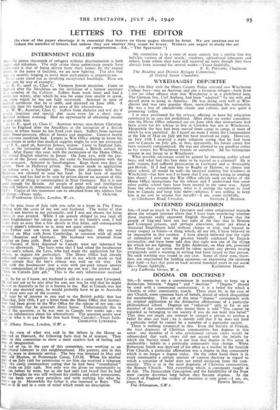WYKEHAMIST DEPORTEE
Sot,—On May ioth the Hants County Police arrested two Winchester College boys—one an Austrian and one a German refugee—both Jews —for no other offence than that Winchester is in a prohibited area. The German boy, Carl Amberg, had been " adopted " by my wife and myself prior to going to America. He was doing very well at Win- chester and was very popular there notwithstanding his nationality. He was a boy of considerable charm and culture, and was quite a promising 'cellist. I at once petitioned for his release offering to have his education continued in an area not prohibited. After about six weeks' considera- tion the Home Office informed me on June 28th that instructions had been given for his release to live at Croydon but not at Winchester. Meanwhile the boy had been moved from camp to camp, at most of which he was underfed. As I heard no more I wrote the Commandant at the Isle of Man on July 9th but have received no reply. However, on July 17thI received a reply telegram saying that he had been sent to Canada on July 4th, so that, apparently, his future career has been seriously compromised. He was not allowed to say goodbye either to his sisters, his Winchester friends or ourselves. All his belongings remain in my house or at Winchester.
What possible advantage could be gained by interning public school boys, and what had this boy done to be treated as a criminal? He is only sixteen, had 'suffered persecution in Germany and is thoroughly pro-British. If I had sent him to Rugby or Harrow, or almost any other school, all would be well—he received nothing but kindness at Winchester—but how was I to know that I was doing wrong in sending him there? I presume the War Office officials took no notice of the Home Office instructions for his release and I understand that some other public school boys have been treated in the same way. Apart from the above considerations, what is it costing the nation to send him to Canada and keep him there—whereas I was willing to keep him at no cost to anyone but myself?—I am, yours faithfully,






























 Previous page
Previous page